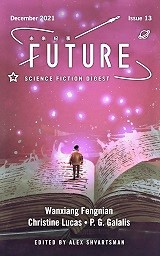 Future Science Fiction Digest #13, December 2021
Future Science Fiction Digest #13, December 2021
“A Mountain of Dust” by Wangxiang Fengnian
“Echoes of a Broken Mind” by Christine Lucas
“Three Times Dad Saved the World, and One Time He Didn’t” by P.G. Galalis
Reviewed by Victoria Silverwolf
Stories from writers based in China, Greece, and the United States appear in this issue.
The novella “A Mountain of Dust” by Wangxiang Fengnian, translated from Chinese by Judith Huang, takes up more than half the magazine. It is set in a world where the rich grow larger in size as they consume more food, and the poor become smaller as they eat less. In extreme cases, people are either as big as mountains or microscopic.
A reporter accepts an assignment to track down a rich man’s son, who deliberately stopped eating in order to enter the world of the very small. By reducing his own intake of food, the reporter journeys into the hidden realm of the tiny people.
His odyssey takes him to a band of miniature bandits, living on what they can steal from big people; a place where even smaller people survive in a garbage dump; and an encounter with an extremely miniscule monk who has a mystical relationship with the forest.
Later, the reporter swells in size to become one of the giants that dominate society. He makes a final gesture intended to bring the very small and the very big together. The way in which the wealthy father and his wayward son are reunited is unexpected.
There are obvious echoes of Richard Matheson’s 1956 novel The Shrinking Man, as well as Jonathan Swift’s 1726 satire Gulliver’s Travels. Although some parts of the plot will be familiar to those who have read these two works, other sections of the narrative are more original. The allegory between physical size and one’s position in society is clear, and may seem too blatant to some readers.
The protagonist of “Echoes of a Broken Mind” by Christine Lucas barely survives on what she can scavenge from abandoned areas of a space station orbiting Jupiter. She suffered a brain injury, which left her with an implant that shows her what seem to be hallucinations of other people and other times. Desperate to contact a daughter she has never seen, she learns something of her own past, contradicting almost everything she thought she knew.
Despite the outer space setting, this is essentially a cyberpunk story. Like many works in the genre, it pictures a technologically advanced society, but one that is gritty and dangerous, with the powerful exploiting the weak. What the main character discovers is likely to surprise the reader as much as it does her. Her relationship with the story’s secondary character is also unexpected, but may be a little harder to accept as probable. Admittedly, it fits the cynical mood of cyberpunk fiction.
The narrator of “Three Times Dad Saved the World, and One Time He Didn’t” by P.G. Galalis is the adult child of a deceased superhero. A recording left by the father explains the source of his powers, and offers a legacy to his offspring. This is a simple tale, in which the details concerning the father’s adventures could have come from a typical comic book. The outcome is inspiring, if predictable.
Victoria Silverwolf got a free meal at work today.